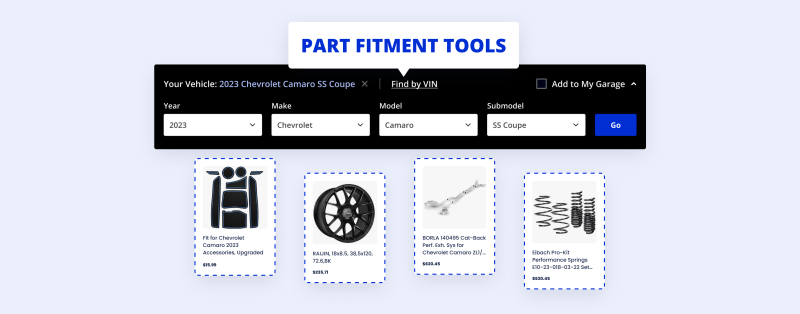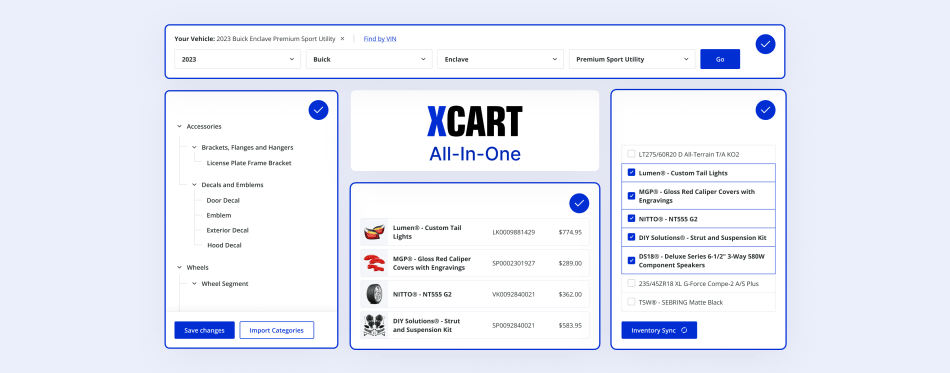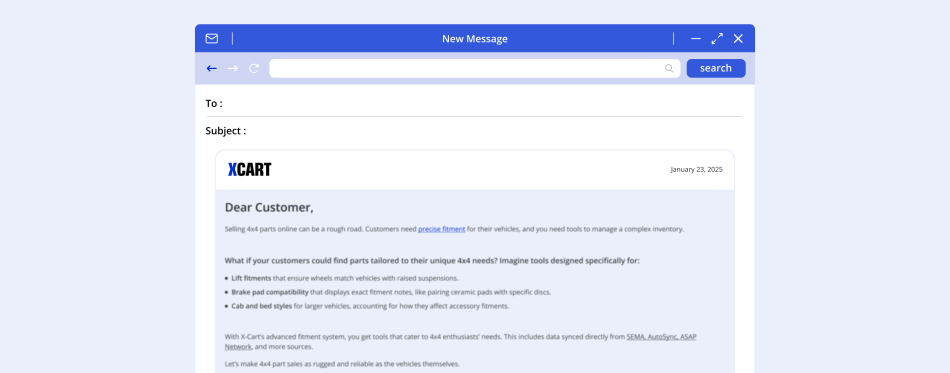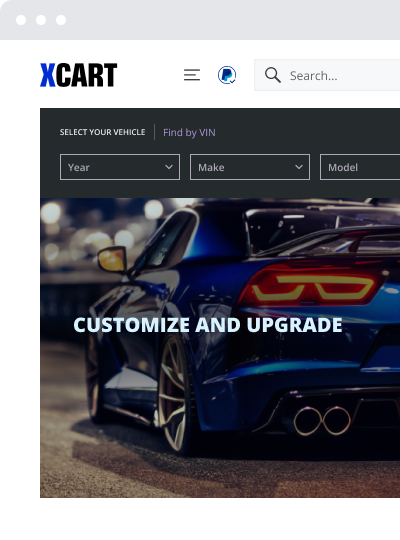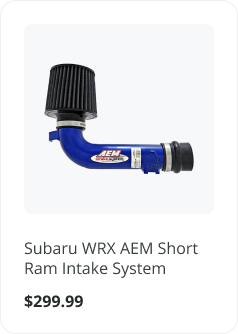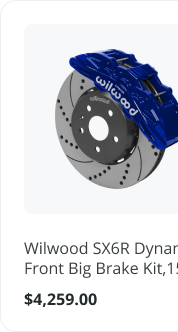Achieve Precision in Part Fitment with Automated Solutions: Main Strategies and Benefits
Nearly 86% of online retail customers return products within a year after purchase. Returned products just fail to meet customer expectations. In auto parts retail, inaccurate fitment data is the leading reason for returns and cart abandonment. That’s why precision in part fitment is critical for automotive online stores.
How can businesses ensure their customers are ordering the right products? The answer is automation for part search and fitment accuracy. Improving the way customers find what they need means enhancing user experience, increasing conversions, and reducing costly errors.
The best way to achieve these is to let users search how they like. In this post, we break down:
- What is fitment?
- What challenges does inaccurate information pose for automotive businesses?
- How to overcome them with automation?
You will also learn about the three advanced product search tools for a smoother customer experience. Let’s start!
What Is Automotive Fitment?
Auto part fitment refers to the compatibility between a specific vehicle and the parts or components designed for it. It ensures that a product, such as a brake pad, alternator, or air filter, will correctly fit and function on a particular vehicle’s make, model, and year.
For example, a brake pad designed for a 2020 Ford F-150 may not fit on a 2021 model due to slight design changes. But there are many more challenges to oversee. Let’s take a look at them below.
Challenges of Auto Part Fitment for Online Retailers
Delivering the wrong product can lead to costly returns, frustrated customers, and reputational damage. To maintain precision, you have to regularly update information, which is quite challenging, especially given the enormous number of SKUs and the diversity of parts and accessories in an automotive catalog.
Below are the most common reasons why fitment data can be difficult to manage.
Manufacturer-Specific Variations
Each automobile manufacturer follows its own set of engineering standards. This results in varied specifications even within the same category. A Ford F-150 might have different brake pad designs than a Chevrolet Silverado. Even though both are full-size trucks. Just sizes or unique installation methods make the difference between a fitting part and a mismatched one.
The tiny yet critical distinctions between manufacturers need careful cataloging of detailed fitment data.
Regional Variations and International Models
Automotive fitment is not a one-size-fits-all scenario in a global scene. Vehicle models, years, and make differ by region. International versions often have distinct specifications to meet local regulations or environmental standards.
For example, a vehicle sold in Europe may have different emissions controls or safety features compared to its U.S. counterpart. This affects the fitment of related parts like exhaust systems or brake components.
Constant Evolution of Vehicle Models
Automobile manufacturers are constantly updating and releasing new vehicle models with different specifications. Each year brings a new set of features, engine types, and dimensions that can affect the auto parts compatibility. Every year, more than 350 new car models are launched worldwide. Failing to account for a subtle yet important change could result in an incorrect item being sold.
Legacy Data Integration
Many businesses in the sector have been around for years if not decades. Their legacy systems often struggle to integrate with newer technologies and databases, especially in areas like automotive fitment. Without modern product data management and automated industry standard support, it’s difficult to ensure that old inventory data is accurate and up to date.
Multiplatform Sales Channels
Each platform, like Amazon or eBay Motors, has its own unique requirements and formatting. Retailers often manually enter and adjust information for car part compatibility across sales channels. This task can quickly become overwhelming with thousands of SKUs and changing product listings.
Effective fitment solves all of the issues above. It allows for easier management of item differences through standardized formats like ACES and PIES. These act like an aftermarket catalog exchange standard. Ensuring accurate details in the auto parts fitment database is no small feat. However, it’s worth the investment.
Let’s see how automated precision has positive effects on business.
5 Business Benefits of Parts Fitment Automation
Automotive fitment automation offers powerful solutions. They aim to reduce human error and manual effort for higher operational efficiency. The business effect of the solutions is what makes them so powerful. It ranges from time savings to higher customer satisfaction and loyalty.
1. All Data in One Place
Automation provides a solution to the headache of managing information across platforms. Fitment data management tools integrate with warehouse distributors (like Wheel Pros or Meyer), catalog providers (like SEMA Data or AutoSync), analytics systems, and more. Once the correct details are entered into a centralized system, it updates across all relevant platforms.
2. Less Manual Work
Automation for automotive eCommerce eases the burden of keeping up with new vehicle models and changing specifications. Compatibility management tools sync with manufacturer databases and third-party sources. Thus, they ensure that the most current parameters are always available.
3. Lower Probability of Returns
An item’s bolt pattern, installation method, or even packaging requirements can be mapped and automatically assigned to the correct vehicle models. Advanced algorithms also flag items that might have similar specs but do not meet the exact tolerances. This prevents costly mistakes. Aftermarket vendors can reduce returns due to enhanced compatibility accuracy.
4. Personalized, More Converting Offers
Features like My Garage allow users to save search results for specific vehicles. It gets easier to find a fitting part for that particular car in the future. The system automatically selects components and accessories for the vehicle, saving time and effort.
Plus, you can analyze the data on which products a customer frequently selects. Thus, you’ll be able to offer personalized discounts or recommend items most relevant to their vehicle. Customers will more likely make a positive purchase decision if the item is highly relevant to their car model.
5. Automated Compliance
Automated solutions help retailers meet regional compliance requirements. They use ACES to maintain accurate data for different vehicle models and PIES to ensure product details meet local regulations.
Automation solves many of the core challenges related to part fitment. Online retailers can offer a smoother, more reliable shopping experience and reduce errors. These ultimately help build long-term customer trust and loyalty.
3 Features for Automotive Fitment Automation That Won’t Break the Bank
Advanced search by year, make, model, VIN lookup, and smart search are the three features that won’t break the bank but will deliver big results:
- Transparent website navigation without frustration;
- Intuitive product search with minimized search time;
- Personalized recommendations for higher conversions and customer loyalty.
These tools are designed to enhance the user experience without stretching your budget.
1. Advanced Search by Year/Make/Model (YMM)
YMM filters are effective tools for finding the right auto parts fitments. It allows users to select the exact year, make, model, and engine type. Thus, businesses can tailor the search results to show only the relevant products.
Utilizing a robust search-by-YMM means increased accuracy, fewer returns, and more satisfied customers. It’s not just about offering a better shopping experience. It’s about real-time, precise results that increase the likelihood of purchase. YMM search filters eliminate confusion, reduce errors, and provide faster access to the right products.
Manufacturers are increasingly requesting the ability to search by Year, Make, and Model—because they understand the power of precision. The more detailed your data—whether it’s engine size, trim level, or submodel—the more personalized the customer experience becomes. It’s the difference between meeting expectations and exceeding them.
If you’re searching for the right solution, you’ll have it all pre-built on X-Cart. It has all the necessary features under a single subscription, including YMM, optimized catalog auto parts management, and more. X-Cart’s YMM tool acts as an auto parts compatibility checker and provides instant, accurate, and relevant results, improving both customer satisfaction and sales.
2. VIN Lookup
VIN (Vehicle Identification Number) lookup lets customers input their vehicle’s unique ID. Such a tool instantly retrieves products that match their car’s specific year, make, and model.
The VIN lookup tool eliminates much of the guesswork involved in selecting the correct items. When it comes to meeting expectations about the ordered part, number of returns and cancellations speaks volumes. VIN lookup can significantly reduce the share of revenues sent in refunds. Because customers who use VIN lookup are more likely to receive exactly what they need the first time.
VIN lookup creates an even more powerful solution when combined with the My Garage feature. It gets easier for them to return and shop for their saved vehicles. The next time they visit your store, they’ll instantly see what matches their exact specifications—no need for additional filtering or searches.
Expert tip: Keep your product catalog updated automatically to ensure VIN lookup delivers relevant information.
X-Cart’s VIN lookup feature gives your customers a tailored shopping experience and precise product matches. It’s another effective auto part compatibility checker that’s pre-built in the all-in-one package.
3. Smart Search in Real Time
Real-time smart search functionality auto-suggests products and corrects spelling errors. It lets buyers find what they need, even if they misspell a search term or description.
Speed and accuracy are critical in eCommerce. A smart search system that refines results on the fly can enhance your site’s usability and increase conversion rates. Users don’t have to waste time manually correcting their queries.
Expert tip: Regularly update your product attributes and metadata. The more comprehensive your descriptions, the more accurate the search results will be.
With X-Cart, this process becomes seamless. CloudSearch integrates with your store’s design to show exactly what fits your customers’ compatible vehicle—instantly.
How to Implement a Fitment Tool Like YMM, VIN Lookup, or Smart Search
Implementing tools like YMM, VIN lookup, or Smart Search can help users find the right parts quickly. It’s a nice effect for all retailers aiming at reducing returns and refunds.
Here’s a simplified guide to get started:
- Choose the right tool. Select the tool that suits your needs. YMM search is great for browsing, while VIN lookup offers more precision. Smart Search gives flexibility with multiple criteria and predictive text. Or search for platforms that offer all of them at once.
- Check compatibility. Ensure the tool works with your website’s design, layout, and catalog. It should function smoothly on all devices and browsers.
- Compare pricing and features. Evaluate different providers, considering pricing, features, and scalability. Choose a solution that fits your current needs and can grow with your business.
- Ensure good UX. The tool should be easy to use and visually integrate with your site. It should feel like a natural part of the shopping experience. All-in-one platforms automatically adjust these tools to the chosen design theme.
- Consider custom filters. Some parts may require additional filters (e.g., engine size or trim level). Check if the tool can handle these without extra coding.
- Test and optimize. Test the tool thoroughly to ensure it works accurately. Optimize for speed, responsiveness, and accuracy.
- Update your data regularly. Keep your vehicle and part databases up to date to ensure the tool provides accurate results and stays current with new models. Prioritize solutions that integrate with various catalog providers and warehouse distributors to automate product data updates.
With the best tools, you’ll be on your way to offering a higher-quality user experience that serves any individual demand. X-Cart Automotive makes adding tools like YMM search, VIN lookup, and Smart Search simple, with everything pre-built and fully integrated. No custom coding or third-party tools are needed.
Its automotive themes are designed to support these tools for a smooth, intuitive shopping experience. With an all-in-one solution, you get better performance, lower costs, and easy data management. The result is higher conversions, more satisfied customers, and effortless integration—right out of the box.
Success Story: FS Parts Overcomes Complex Data and Fitment Challenges with X-Cart
FS Parts is an online retailer specializing in automotive parts. The company had difficulties managing a complex catalog with varying specifications (e.g., make, model, year). They also struggled with time-consuming catalog updates and poor customer search experiences. These imperfections led to high return rates.
FS Parts implemented X-Cart’s eCommerce platform. It provided tools like bulk catalog import, CloudSearch, and Year/Make/Model (YMM) filters. These features improved data management and made it easier for customers to find compatible car parts.
With X-Cart’s automotive-focused tools, FS Parts:
- Quickly imported and updated product data, reducing errors and saving time.
- Improved customer search accuracy, resulting in fewer returns.
- Enhanced fitment accuracy with YMM filters and My Garage.
The company reported faster, more accurate orders and increased business growth.
FS Parts Overcomes Complex Data and Fitment Challenges with X-Cart

Looking for a similar experience?
Conclusion
Consider going for an automated part fitment functionality to:
- Streamline finding and ordering items;
- Reduce errors;
- Improve customer satisfaction;
- Boost business growth;
- Stay compliant with no effort.
Integrate advanced search functionalities like YMM filters, VIN lookup, and real-time smart search. They will provide the best shopping experience to minimize returns and drive higher conversion rates.
| Before Automation | After Automation |
| ❌ Inaccurate part fitment leads to returns and cart abandonment. | ✅ Accurate fitment data ensures customer satisfaction and minimizes errors. |
| 🛠️ Manual updates are challenging and prone to mistakes. | 🤖 Automated solutions streamline data updates, improve accuracy, and reduce manual effort. |
| 😤 Customer frustration due to outdated or incorrect data. | 😊 Improved shopping experience with accurate, up-to-date data. |
| ⚠️ Compliance risks due to inconsistent data. | 🌍 Automation helps manage regional compliance and supports global expansion. |
| 🔍 Finding the right part is difficult for customers without advanced search tools. | 🔎 Advanced search options like YMM filters and VIN lookup make it easier for customers to find the right part. |
Help your customers easily and confidently find the perfect part for their vehicles. The first step? Explore how integrating X-Cart’s advanced product search functionalities can optimize your automotive store today.
Don’t wait—upgrade your search system and watch customer satisfaction and sales soar!
About the author

